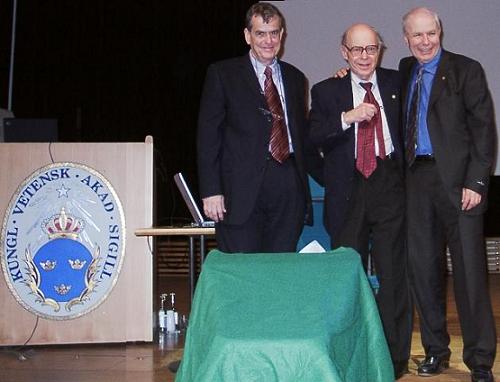Hershko and his American colleague Prof. Irwin Rose talk about the first days of the research that led to the discovery that won the two the Nobel Prize, together with Prof. Czechnovar who joined when there was already a general idea but the exact mechanism had not yet been discovered
Avi Blizovsky, Stockholm

The city of Haifa starred in the presentations of two Nobel Prize winners in Israeli chemistry. Mainly in Prof. Aharon Chachanover's lecture, and then the two focused on the monastery next to the Rambam Hospital - the place where they worked on deciphering the ubiquitin mechanism.
The two, and their American partner Prof. Irwin Rose, spoke for about 40 minutes each about the path that led to the discovery, and in part of the time they also addressed the issue of using the discovery to discover a new strategy for fighting serious diseases. Prof. Chechenover said that a lack of ubiquitin, as well as an excess, each in their own way causes the spread of certain types of cancer, therefore it is necessary to investigate the issue in depth and try to find a drug that will work only at a certain point in the process where ubiquitin joins the protein intended for destruction.
In his lecture, Prof. Hershko, who opened the series and also won the honor at the press conference afterwards from Prof. Rose as the main person responsible for the discovery, said that the biochemists of that time underestimated the field of protein breakdown and that it was not accepted then to publish scientific articles in the field. Therefore, Prof. Hershko asked Prof. Rose to come to him for a sabbatical. After that, the two kept in touch and Prof. Rose even conducted summer seminars in the USA for Prof. Hershko's group.
In the summer of 1979, the staff members of the two laboratories succeeded (in addition to Chechenover, Hershko also brought other researchers from his laboratory with him to the summer seminar). That same summer, the researchers isolated a certain enzyme, which they later named ubiquitin because one of its properties was that it attached to many types of proteins.
Prof. Tsachanover emphasized that in the XNUMXs and even in the XNUMXs, many researchers were convinced that there was no connection between the proteins that enter the body in food and the proteins inside the body, and that the proteins in food are only broken down to produce energy while the proteins in the body remain stable, but no one could explain why there are proteins in the body which disintegrate within minutes while the others last for many days. Only later did it become clear that the body is constantly building and breaking down proteins and that what seems stable is actually protein that the body is constantly creating and breaking down and maintains a constant level of. Decomposition of proteins occurs during cell division, during the breakdown of food, and also during control processes."
"Students studying biochemistry today have it easier," said Prof. Aharon Chachanover in response to a reporter's question at the press conference held yesterday after the speeches of the three winners of the Nobel Prize in Chemistry at the University of Stockholm. The reason he said: they don't need to purify enzymes to use them for experiments. Today they simply take the prepared enzymes and use them in an experiment, however, in other respects it is much more difficult because the questions facing science today are much more difficult, therefore they have to use other methods. In any case, the students today are very bright and I learn from them. The only problem is that they disperse and I have to reset them once a month, sift out most of the things they did that month, leave them with the core and allow them to move on from there."
The three were asked about the role of a good teacher, and Chechenover said that he did have a good teacher, but science does not advance only thanks to mentors, but thanks to hard work and continuity. According to him, before he went to do his doctorate, he researched Hershko's friends in Jerusalem and then decided to work with him. Even today, he investigates the doctoral students who wish to work with him to know the seriousness of their intentions. "I won't accept someone who just walks by the lab and asks me as his supervisor without knowing about me."
In a conversation with me, Prof. Hershko said that the week is full of ceremonies, too much for his taste, and that he hopes to return to his laboratory on Sunday, to work.
After the press conference, Hershko and Cchenover, together with the winner of the Nobel Prize in Physics, David Gross - who attended high school, and received his first and second degrees in Jerusalem, rushed to the Jewish Community House in Stockholm to light Hanukkah candles. The ceremony was performed jointly by the Orthodox rabbi and the Conservative rabbi as well as by the two cantors. It seems that in Israel such cooperation did not make sense. By the way, about 5,000 Jews are members of the community, only ten percent of them are Orthodox.
Today is a relatively free day, except for a reception at the house of the Israeli ambassador Avitar Menor. Tomorrow morning, Friday, there will be a general rehearsal for the prize distribution ceremony and in the afternoon - the ceremony itself. In the evening, the traditional banquet will be held - and we will of course report on that.
